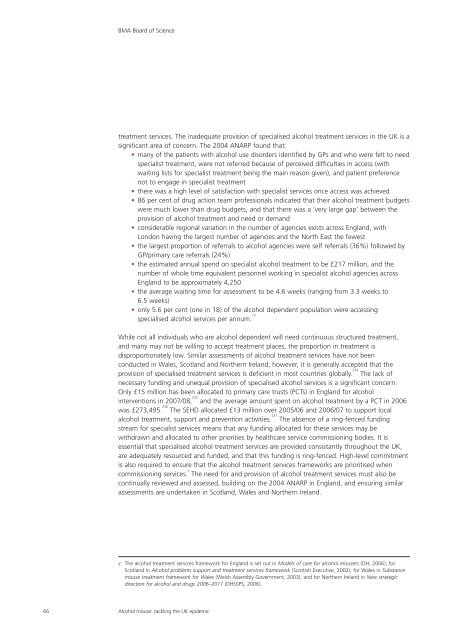Alcohol misuse: tackling the UK epidemic - London
Alcohol misuse: tackling the UK epidemic - London
Alcohol misuse: tackling the UK epidemic - London
Create successful ePaper yourself
Turn your PDF publications into a flip-book with our unique Google optimized e-Paper software.
66<br />
BMA Board of Science<br />
treatment services. The inadequate provision of specialised alcohol treatment services in <strong>the</strong> <strong>UK</strong> is a<br />
significant area of concern. The 2004 ANARP found that:<br />
many of <strong>the</strong> patients with alcohol use disorders identified by GPs and who were felt to need<br />
specialist treatment, were not referred because of perceived difficulties in access (with<br />
waiting lists for specialist treatment being <strong>the</strong> main reason given), and patient preference<br />
not to engage in specialist treatment<br />
<strong>the</strong>re was a high level of satisfaction with specialist services once access was achieved<br />
86 per cent of drug action team professionals indicated that <strong>the</strong>ir alcohol treatment budgets<br />
were much lower than drug budgets, and that <strong>the</strong>re was a ‘very large gap’ between <strong>the</strong><br />
provision of alcohol treatment and need or demand<br />
considerable regional variation in <strong>the</strong> number of agencies exists across England, with<br />
<strong>London</strong> having <strong>the</strong> largest number of agencies and <strong>the</strong> North East <strong>the</strong> fewest<br />
<strong>the</strong> largest proportion of referrals to alcohol agencies were self referrals (36%) followed by<br />
GP/primary care referrals (24%)<br />
<strong>the</strong> estimated annual spend on specialist alcohol treatment to be £217 million, and <strong>the</strong><br />
number of whole time equivalent personnel working in specialist alcohol agencies across<br />
England to be approximately 4,250<br />
<strong>the</strong> average waiting time for assessment to be 4.6 weeks (ranging from 3.3 weeks to<br />
6.5 weeks)<br />
only 5.6 per cent (one in 18) of <strong>the</strong> alcohol dependent population were accessing<br />
specialised alcohol services per annum. 13<br />
While not all individuals who are alcohol dependent will need continuous structured treatment,<br />
and many may not be willing to accept treatment places, <strong>the</strong> proportion in treatment is<br />
disproportionately low. Similar assessments of alcohol treatment services have not been<br />
conducted in Wales, Scotland and Nor<strong>the</strong>rn Ireland; however, it is generally accepted that <strong>the</strong><br />
provision of specialised treatment services is deficient in most countries globally. 234<br />
The lack of<br />
necessary funding and unequal provision of specialised alcohol services is a significant concern.<br />
Only £15 million has been allocated to primary care trusts (PCTs) in England for alcohol<br />
interventions in 2007/08, 235<br />
and <strong>the</strong> average amount spent on alcohol treatment by a PCT in 2006<br />
was £273,495. 236<br />
The SEHD allocated £13 million over 2005/06 and 2006/07 to support local<br />
alcohol treatment, support and prevention activities. 237<br />
The absence of a ring-fenced funding<br />
stream for specialist services means that any funding allocated for <strong>the</strong>se services may be<br />
withdrawn and allocated to o<strong>the</strong>r priorities by healthcare service commissioning bodies. It is<br />
essential that specialised alcohol treatment services are provided consistantly throughout <strong>the</strong> <strong>UK</strong>,<br />
are adequately resourced and funded, and that this funding is ring-fenced. High-level commitment<br />
is also required to ensure that <strong>the</strong> alcohol treatment services frameworks are prioritised when<br />
commissioning services. v<br />
The need for and provision of alcohol treatment services must also be<br />
continually reviewed and assessed, building on <strong>the</strong> 2004 ANARP in England, and ensuring similar<br />
assessments are undertaken in Scotland, Wales and Nor<strong>the</strong>rn Ireland.<br />
v The alcohol treatment services framework for England is set out in Models of care for alcohol <strong>misuse</strong>rs (DH, 2006); for<br />
Scotland in <strong>Alcohol</strong> problems support and treatment services framework (Scottish Executive, 2002); for Wales in Substance<br />
<strong>misuse</strong> treatment framework for Wales (Welsh Assembly Government, 2003); and for Nor<strong>the</strong>rn Ireland in New strategic<br />
direction for alcohol and drugs 2006–2011 (DHSSPS, 2006).<br />
<strong>Alcohol</strong> <strong>misuse</strong>: <strong>tackling</strong> <strong>the</strong> <strong>UK</strong> <strong>epidemic</strong>
















